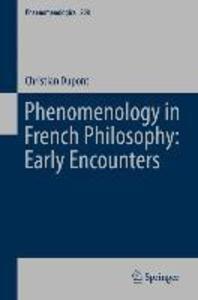
Sofort lieferbar (Download)
This work investigates the early encounters of French philosophers and religious thinkers with the phenomenological philosophy of Edmund Husserl. Following an introductory chapter addressing context and methodology, Chapter 2 argues that Henri Bergson's insights into lived duration and intuition and Maurice Blondel's genetic description of action functioned as essential precursors to the French reception of phenomenology. Chapter 3 details the presentations of Husserl and his followers by three successive pairs of French academic philosophers: Léon Noël and Victor Delbos, Lev Shestov and Jean Hering, and Bernard Groethuysen and Georges Gurvitch. Chapter 4 then explores the appropriation of Bergsonian and Blondelian phenomenological insights by Catholic theologians Édouard Le Roy and Pierre Rousselot. Chapter 5 examines applications and critiques of phenomenology by French religious philosophers, including Jean Hering, Joseph Maréchal, and neo-Thomists like Jacques Maritain. A concluding chapter expounds the principal finding that philosophical and theological receptions of phenomenology in France prior to 1939 proceeded independently due to differences in how Bergson and Blondel were perceived by French philosophers and religious thinkers and their respective orientations to the Cartesian and Aristotelian/Thomist intellectual traditions.
Inhaltsverzeichnis
PREFACE. - CHAPTER 1: INTRODUCTION- I. Occasion. - II. Contribution. - III. Methodology and Terminology. - A. Definition of Reception. - B. Definition of Phenomenology. - C. Definition of Religious Thought. - IV. Plan. - CHAPTER 2: PRECURSORS TO THE RECEPTION OF PHENOMENOLOGY IN FRANCE, 1889-1909. - I. Three Major Currents in French Philosophy at the End of the Nineteenth Century. - A. Positivism. - B. Idealism. - C Spiritualism. - D. Summary: Anticipations of Phenomenology in French Positivism, Idealism and Spiritualism. - II. Henri Bergson: Lived Duration and Intuition. - A. Bergson s Original Insight. - B. Bergson s Principal Themes: Duration and Intuition. - C. Bergson as a Precursor to Husserlian Phenomenology. - D. Bergson s Influence on French Theologians. - III. Maurice Blondel: A Phenomenology of Action. - A. Blondel s Original Insight. - B. Blondel s Principal Theme: Action. - C. Blondel as a Precursor to Husserlian Phenomenology. - D. Blondel s Influence on French Theologians. - IV. Conclusion: Bergson and Blondel as Precursors to the Reception of Husserlian Phenomenology in France. - CHAPTER 3: FOUR PHASES IN THE RECEPTION OF PHENOMENOLOGY IN FRENCH PHILOSOPHY, 1910-1939. - I. Léon Noël and Victor Delbos. - A. Léon Noël. - B. Victor Delbos. - C. Noël and Delbos as Interpreters of Phenomenology. - II. Lev Shestov and Jean Héring. - A. Lev Shestov. - B. Jean Héring. - C. Shestov s Reply to Héring. - D. Héring s Rebuttal to Shestov. - E. Shestov and Héring as Interpreters of Phenomenology. - III. Bernard Groethuysen and Georges Gurvitch. - A. Bernard Groethuysen. - B. Interlude: German Phenomenologists in France. - C. Georges Gurvitch. - D. Groethuysen and Gurvitch as Interpreters of Phenomenology. - IV. Emmanuel Levinas and Jean-Paul Sartre. - A. Emmanuel Levinas. - B. Jean-Paul Sartre. - C. Levinas and Sartre as Interpreters of Phenomenology. - V. Conclusion: Four Phases in the Reception of Phenomenology in FrenchPhilosophy, 1910-1939. - A. Phase One: Awareness of Husserl as a Critic of Psychologism. - B. Phase Two: Polemics Over Ideas and the Logos Essay. - C. Phase Three: Popularization of Phenomenology. - D. Phase Four: Original French Appropriations of Phenomenology. - E. Other Figures, Further Aspects. - CHAPTER 4: RECEPTIONS OF PHENOMENOLOGICAL INSIGHTS IN FRENCH RELIGIOUS THOUGHT, 1901-1929. - I. Édouard Le Roy. - A. His Life and Works. - B. Le Roy and Bergson. - C. Le Roy s Application of Bergsonian Insights to Religious Thought. - D. Le Roy s Contribution to the Theological Reception of Phenomenology. - II. Pierre Rousselot. - A. His Life and Works. - B. Rousselot and Blondel. - C. Rousselot s Application of Blondelian Insights to Religious Thought. - D. Rousselot s Contribution to the Theological Reception of Phenomenology. - CHAPTER 5: RECEPTIONS OF HUSSERLIAN PHENOMENOLOGY IN FRENCH RELIGIOUS THOUGHT, 1926-1939. - I. Jean Héring. - A. His Life and Works. - B. Phenomenology and the Philosophy of Religion. - C. Héring s Application of Phenomenology to Religious Thought . - II. Gaston Rabeau. - A. His Life and Works. - B. Phenomenology and Theological Epistemology. - C. Rabeau s Application of Phenomenology to Religious Thought. - III. Joseph Maréchal. - A. His Life and Works. - B. Phenomenology and the Critical Justification of Metaphysics. - C. Maréchal s Application of Phenomenology to Religious Thought. - IV. Neo-Thomist Encounters with Phenomenology. - A. The Société Thomiste and the Journée d Études. - B. Neo-Thomist Appraisals of Phenomenology V. Conclusion: Two Stages in the Reception of Phenomenology in French Religious Thought Prior to 1939. - A. Stage One: Integration of Bergsonian and Blondelian Insights, 1901-1929. - B. Stage Two: Applications and Appraisals of Phenomenology, 1926-1939. - CHAPTER 6: CONCLUSION. - I. Receptions of Phenomenology in French Academic Circles Prior to 1939. - II. Appropriations of Phenomenology by French Philosophers. - III. Appropriations of Phenomenology by French Religious Thinkers. - IV. French Receptions of Phenomenology since 1939. - Index.
Produktdetails
Erscheinungsdatum
20. November 2013
Sprache
englisch
Seitenanzahl
338
Dateigröße
2,47 MB
Reihe
Phaenomenologica
Autor/Autorin
Christian Dupont
Verlag/Hersteller
Kopierschutz
mit Wasserzeichen versehen
Produktart
EBOOK
Dateiformat
PDF
ISBN
9789400746411
Entdecken Sie mehr
Pressestimmen
From the reviews:
Dupont s book is a clear and readable account of a complex moment, and can serve as an introduction to French philosophy more generally in the first half of the twentieth century. It provides accessible surveys of the work of a number of important thinkers within and outside of the phenomenological tradition . The book will thus be an aid for scholars, and it is written so that readers can dip in and read individual sections depending on their interest. (Edward Baring, Notre Dame Philosophical Reviews, ndpr. nd. edu, 2014)
Bewertungen
0 Bewertungen
Es wurden noch keine Bewertungen abgegeben. Schreiben Sie die erste Bewertung zu "Phenomenology in French Philosophy: Early Encounters" und helfen Sie damit anderen bei der Kaufentscheidung.









